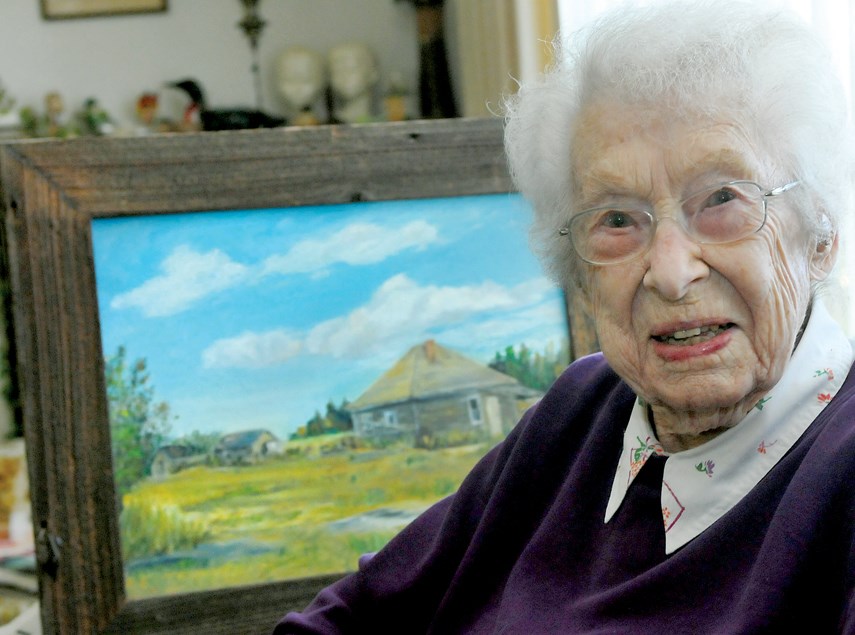Mary Hunter was born in 1916, on the family farm on the Saskatchewan prairie.
A painting of that long ago and far away home hangs in the North Vancouver home where she has lived for 67 years. Mary points out the room where she was born and the painting’s frame, made from wood salvaged from building the back porch. Two barns in the painting are in the wrong place.
“They were here,” Mary says, indicating the painting’s lower left corner. For Mary, the distant past is within living memory. Her recollections are detailed and accurate, punctuated with laughter as she renders them into stories.
When Mary Molland graduated from high school in Saskatoon, war in Europe was looming even as the Depression’s grip on the country eased. The vote had been extended to Saskatchewan women (not every woman, to be sure) in the year of Mary’s birth, followed by British Columbia in 1917. Even so, career options for women were limited to marriage and motherhood, nursing and teaching.
Mary chose to train as a teacher. She found her calling on a student-teacher visit to the School for the Deaf. Students of all ages conversing in silence, fingers flying, faces animated; a grand piano set on a wood floor so students could feel the music they were making. These were revelations that led Mary to work with the deaf.
“It looked so good. It looked so good to me, I thought I’d like to be here.” Mary’s arms open as wide as the smile on her face. “To me, it was bliss. I somehow saw I had something I could contribute for the deaf.”
Mary learned to sign. She taught at the school and became Saskatoon’s court interpreter for cases involving deaf people.
Life was rewarding, but its course changed after a visit to B.C., a visit that included a blind date. Mary’s sole question about the prospective date, “Can he dance?” was answered in the affirmative. Norman Hunter was not only a good dancer, he had a lovely tenor voice. After a second visit to the coast, Mary said yes, and they married in 1942.
The newlyweds lived with Norman’s parents in North Vancouver until they could rent a house of their own. Mary taught at the Jericho School for the Deaf and started its kindergarten class. Norman had signed on as a dishwasher with the CPR steam ships, converted to troop transports during the war. He retired as chief steward of the Princess Patricia.
By 1950, they found a house they could afford. The street where Mary and Norman made their home and raised their family is quiet and treed, with small houses fronted by small gardens.
Mary remembers the houses and their residents in perfect detail. Every day, Mr. Pierce would emerge from the cottage across the street, immaculate in his Prince Albert coat, bowler hat and furled umbrella, bound for the O.B. Allan jewelry store on Granville Street.
Later in the day, Mrs. Pierce would set off to her job as wardrobe mistress at the Lyric Theatre, also on Granville Street.
The Pierces and their cottage are gone, along with two of the three conifers they planted as seedlings dug from “the bush” to the west, which is now Delbrook.
The surviving tree is on district property and may therefore be spared. Where the cottage stood, a box is rising from the clear-cut lot. Two-storeys high, it blocks the view Mary has enjoyed for 67 years.
Mary Hunter remembers her neighbours and their families, their homes and gardens. She remembers further back, to life on the family farm, just down the road from the Diefenbaker’s farm. She remembers her parents’ stories about their parents and grandparents. Such memories merge history and heritage to tell the story of our country.
Life on the farms and small towns of the Canadian prairie a century ago is envisioned more easily perhaps than North Vancouver as it was in the 1950s. The Canada of 100 or 150 years ago is now frozen in time. Our elders’ recollections today are within living memory. They offer a range of perspectives and stories about life in Canada before it transforms into our history.
Laura Anderson works with and for seniors on the North Shore. Contact her at 778-279-2275 or e-mail her at [email protected].



